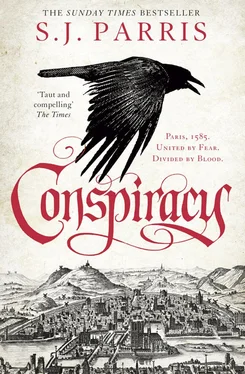Stephanie Merritt - Conspiracy
Здесь есть возможность читать онлайн «Stephanie Merritt - Conspiracy» — ознакомительный отрывок электронной книги совершенно бесплатно, а после прочтения отрывка купить полную версию. В некоторых случаях можно слушать аудио, скачать через торрент в формате fb2 и присутствует краткое содержание. Год выпуска: 2016, ISBN: 2016, Издательство: HarperCollins Publishers, Жанр: Исторический детектив, на английском языке. Описание произведения, (предисловие) а так же отзывы посетителей доступны на портале библиотеки ЛибКат.
- Название:Conspiracy
- Автор:
- Издательство:HarperCollins Publishers
- Жанр:
- Год:2016
- ISBN:9780007481262
- Рейтинг книги:5 / 5. Голосов: 1
-
Избранное:Добавить в избранное
- Отзывы:
-
Ваша оценка:
- 100
- 1
- 2
- 3
- 4
- 5
Conspiracy: краткое содержание, описание и аннотация
Предлагаем к чтению аннотацию, описание, краткое содержание или предисловие (зависит от того, что написал сам автор книги «Conspiracy»). Если вы не нашли необходимую информацию о книге — напишите в комментариях, мы постараемся отыскать её.
Conspiracy — читать онлайн ознакомительный отрывок
Ниже представлен текст книги, разбитый по страницам. Система сохранения места последней прочитанной страницы, позволяет с удобством читать онлайн бесплатно книгу «Conspiracy», без необходимости каждый раз заново искать на чём Вы остановились. Поставьте закладку, и сможете в любой момент перейти на страницу, на которой закончили чтение.
Интервал:
Закладка:
Paul had liked his surroundings austere; I almost smiled at the painstaking self-denial in evidence as I closed the door behind me. The room smelled of woodsmoke, damp and that stale odour of unwashed clothes that often clings to bachelors. I felt a stab of pity for him; he had allowed himself so little joy in his determination to please God, and look what it had brought him. Perhaps that was the saddest aspect of his death; he had never been a man who cared much for worldly advancement. If he had joined the Catholic League – those hardline religious conservatives determined to restore the purity of the Church, at any cost – it would have been from a genuine zeal to purge France of all that was unholy. Mind you, that was what the Inquisition in my country liked to claim too.
The main room contained only a wide desk under the window and a carved chest, of the kind used to store linen, in the opposite corner. The desk held an inkhorn, a pot containing three quills, a block of sealing wax and a small penknife; to the left of the inkhorn sat a rectangular wooden box, about a foot and a half long and half as much wide, its surface inlaid with intricate patterns in mother-of-pearl and ivory and fastened with a padlock. A mournful Virgin holding an infant with the face of an irascible old man hung on the wall opposite the window. The adjoining room was partitioned off by a curtain, which I drew back to reveal a space that hardly deserved to be called a bedchamber; more an alcove barely wide enough to hold a single bed. There was another, smaller casement here; I peered out to see that it opened on to the yard side of the house, where part of the ground floor jutted out in a sloping roof directly below the window. Above the bed Paul had fixed a heavy crucifix, with a tortured Christ gazing reproachfully, his neck twisted down to one side so that, if you were supine with your head on the pillow, his wounded eyes would stare right into you. Dio porco ; imagine waking to that sight every morning. I knelt to look under the bed; at first I could only make out a chamber pot and some unidentified shape among drifts of dust. I stretched in, groping towards it until my fingers touched the edge of a wooden casket. I drew it out to find it was secured with a sturdy iron padlock. The keyhole was too small to accommodate the blade of my knife; I cast around the room in search of an alternative, but the best I could do was a poker in the fireplace, with which I forced the padlock until it snapped open and a collection of small items wrapped in cloth tumbled out on to the boards. I picked one up, intrigued; it was tied around with twine and gave off a faint odour of decay and alcohol. I unwrapped the bindings and dropped the object immediately, smothering a cry of disgust as I realised I was looking at a severed human finger, seemingly pickled to preserve it, though with dubious success. The flesh was blackened, the torn end of bone and sinew ragged and stringy. Why had Paul hidden such a thing? I tried to refold it in its cloth wrapping when I noticed a tiny paper label attached to the string. It read ‘A. Briant’. The name sounded familiar; I searched the index of my memory as I replaced it in the box and picked up another bundle. This one rattled lightly; scrawled on its label was the name ‘E. Campion’. Already guessing what I would find, I untied it gingerly and tipped the contents into my palm, wincing as I looked at a handful of bloody teeth. The name Campion had sprung the lock of my memory; Father Edmund Campion had been a Jesuit missionary to England, caught and executed for treason four years ago by Queen Elizabeth’s government. Alexander Briant was one of the missionary priests executed with him. It seemed Paul had been collecting relics of English martyrs, items highly prized by the English Catholic exiles in Paris, though the trade was illegal. I wrapped the teeth again, intending to push the whole grisly box back where I had found it, when the label of another packet caught my eye. I lifted it and read ‘J. Gifford’. My stomach clenched as I untied the string holding it; the cloth weighed almost nothing. Inside was a lock of blond hair, matted with dried blood. I had known an English priest by the name of Gifford once; I had watched him die. It seemed a lifetime ago. The bloodied hair lay in the palm of my hand like a reproach, or a warning. I shivered. Whatever Paul was involved in was not my business; I needed to find what I came for and get as far away as possible. I had been too close to too many deaths, these past few years. I shoved the box back into the shadows under the bed and turned my attention to the desk.
The padlock on the ornamental casket proved easy enough to force; the lid opened to reveal a pile of papers, as I had supposed. I took out the first sheet; it was folded in half to make a pamphlet, and on the front was handwritten ‘THE KING OF SODOM’ in strident capitals. Beneath this headline was a crude sketch of a crowned and bearded figure bent double and wearing women’s clothes, which he had hitched up to his waist to allow another man to take him from behind while wielding a flagellant’s whip. I opened the paper; inside was a polemic against the licentiousness of the court, explaining in lurid detail that King Henri III of France could not get an heir because he wouldn’t take his prick out of the Duke d’Epernon’s arse for long enough. I turned the paper back to look at the drawing. I recognised the style, but the version I had seen before was typeset and printed with a woodcut; one of the many anonymous handbills sold for a sou, thrust at you in the square outside Notre Dame by men who took care to keep their faces covered. You could find these pamphlets, discarded, blowing along the gutter near the colleges on the Left Bank. Even a cursory glance at this draft was enough to see that the author had conflicted feelings about the acts he described with such pious outrage; he had worked himself into such a pitch of righteous fury that in places his pen had scored right through the paper, yet it was impossible to disguise the relish in his lingering and explicit account of what the King and his mignons – those louche young nobles who hung about the court to fawn on him – were supposed to get up to in the royal bedchamber. Poor Paul, I thought again, if this were his work.
I lifted out the next paper to find another handwritten draft. The headline on the cover of this one ran: ‘An Account of the Most Glorious Achievements and Military Successes of Our Great King Henri III’. Inside, the page was left blank, except for one word in minute letters at the bottom: Rien. I had to bite back a laugh; it seemed Paul had possessed a sense of humour after all. This one would have wounded the King far more than any number of drawings of him being mounted by his friends; he had always enjoyed courting notoriety but he could not bear to be thought a failure. It did not surprise me to find that Paul had been providing the copy for inflammatory handbills, given his affiliation with the Catholic League – though I had to wonder why he had kept these incriminating drafts, knowing that the punishment for printing or distributing such libel against the King was execution. I replaced the papers in the box. Perhaps that was exactly what had happened, but without the courtesy of a trial.
A sound from below – a shout, a door slamming – jolted me from my thoughts. I paused, straining to hear, right hand moving instinctively towards my dagger, until I was satisfied that the sound had come from outside. I moved to the window and peered down, keeping to one side so that I would not be seen, but the street appeared to be empty. Again, I caught a faint smell of woodsmoke and glanced across to the small hearth opposite, where the remnants of a meagre fire lay cold in the grate. Paul had not given any indication during our brief conversation in the confessional that he believed himself to be in danger. Rather, he had spoken with the self-congratulating assurance of someone who considered himself favoured by the rising power. He had even hinted that the King was soon to fall. I wondered if he had had time to recognise his assailant before the blow struck, and whether the killer had waited around to see the bargemen pull him out of the water, or knew that he had been taken to the abbey. It would not take long before my presence at his deathbed leaked out; if that became known to whoever had wanted him dead, that person may fear I knew more than I should.
Читать дальшеИнтервал:
Закладка:
Похожие книги на «Conspiracy»
Представляем Вашему вниманию похожие книги на «Conspiracy» списком для выбора. Мы отобрали схожую по названию и смыслу литературу в надежде предоставить читателям больше вариантов отыскать новые, интересные, ещё непрочитанные произведения.
Обсуждение, отзывы о книге «Conspiracy» и просто собственные мнения читателей. Оставьте ваши комментарии, напишите, что Вы думаете о произведении, его смысле или главных героях. Укажите что конкретно понравилось, а что нет, и почему Вы так считаете.












